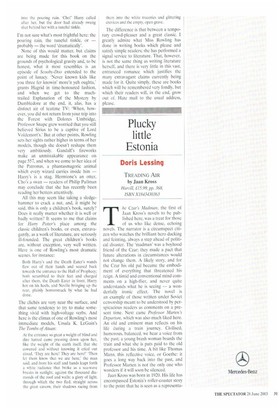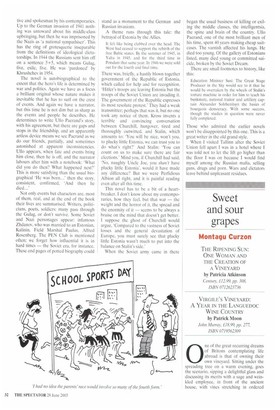Plucky little Estonia
Doris Lessing
TREADING AIR by Joan Kross Hang, 115.99, pp. 368, ISBN X1843430363 he Czar's Madman, the first of Jaan Kross's novels to be published here, was a treat for those of us who like dense, echoing novels. The narrator is a circumspect citizen who watches the brilliant hero ducking and feinting, always a step ahead of political disaster. The 'madman' was a boyhood friend of the Czar; they made a pact that future alterations in circumstances would not change them. A likely story, and for the Czar his old pal became the embodiment of everything that threatened his reign. A timid and conventional mind comments on a high-flier, and never quite understands what he is seeing — a wonderfully ironic effect. The novel is an example of those written under Soviet censorship meant to be understood by perspicacious readers as comments on a present time. Next came Professor Marten's Departure, which was also much liked here. An old and eminent man reflects on his life during a train journey. Civilised, humorous, balanced, we hear a voice from the past; a young brash woman boards the train and what she is puts paid to the old professor and his time. A bit like Thomas Mann, this reflective voice. or Goethe: it goes a long way back into the past, and Professor Marten is not the only one who wonders if it will soon be silenced.
Jaan Kross was born in 1920. His life has encompassed Estonia's roller-coaster story to the point that he is seen as a representa tive and spokesman by his contemporaries. Up to the German invasion of 1941 nothing was untoward about his middle-class upbringing, but then he was imprisoned by the Nazis as 'a national sympathiser'. This has the ring of grotesquerie inseparable from the definitions of ideological dictatorships. In 1944 the Russians sent him off on a sentence 5+5, which means Gulag, five, exile, five. He was 'pardoned' by Khrushchev in 1954.
The novel is autobiographical to the extent that the hero's life is determined by war and politics. Again we have as a focus a brilliant original whose nature makes it inevitable that he has to surf on the crest of events. And again we have a narrator, but this time he is not dim but as sharp as the events and people he describes. He determines to write Ullo Paerand's story, with his agreement, but there are gaps and stops in the friendship, and an apparently artless device means we see Paerand as we do our friends, partially, and sometimes astonished at apparent inconsistencies. Ullo appears, when fate and events bring him close, then he is off, and the narrator labours after him with a notebook: 'What did you do then? What happened next?' This is more satisfying than the usual biographical 'He was born...' then the story, consistent, confirmed, 'And then he died...'
Not only events but characters are, most of them, real, and at the end of the book their lives are summarised. Writers, politicians, poets, soldiers: many pass through the Gulag, or don't survive. Some Soviet and Nazi personages appear: infamous Zhdanov, who was married to an Estonian, Kalinin, Field Marshal Paulus, Alfred Rosenberg. The PEN Club is mentioned often; we forget how influential it is in hard times — the Soviet era, for instance. These end pages of potted biography could stand as a monument to the German and Russian invasions.
A theme runs through this tale: the betrayal of Estonia by the Allies.
It felt like being clubbed over the head. The West had ceased to support the rebirth of the free Baltic states. By the summer of 1945, in Yalta in 1945. and for the third time in Potsdam that same year. In 1946 we were sold out for the fourth and final time.
There was, briefly, a hastily blown together government of the Republic of Estonia, which called for help and for recognition. 'Hitler's troops are leaving Estonia but the troops of the Soviet Union are invading it. The government of the Republic expresses its most resolute protest.' They had a weak transmitter; perhaps that was it, but no one took any notice of them. Kross invents a terrible and convincing conversation between Churchill, hungover, tired and thoroughly outwitted, and Stalin, which amounts to: 'You will be nice, won't you, to plucky little Estonia, we can trust you to do what's right?' And Stalin: 'You can count on us to make sure there are fair elections.' Mind you, if Churchill had said, `No, naughty Uncle Joe, you shan't have plucky little Estonia', would it have made any difference? But we were Perfidious Albion all right, and it is painful reading even after all this time.
This novel has to be a bit of a heartbreaker. I don't know about my contemporaries, how they feel, but that war — the weight and the horror of it, the spread and the enormity of it — seems to be always a bruise on the mind that doesn't get better. I suppose the ghost of Churchill would argue, 'Compared to the vastness of Soviet losses and the general devastation of Europe, you must surely see that plucky little Estonia wasn't much to put into the balance on Stalin's side.'
When the Soviet army came in there began the usual business of killing or exiling the middle classes, the intelligentsia, the spine and brain of the country. Ullo Paerand, one of the most brilliant men of his time, spent 40 years making cheap suitcases. The varnish affected his lungs. He died too young. Of the gallery of Estonians listed, many died young or committed suicide, broken by the Soviet Dream. There are small footnotes to history, like this:
Education Minister Susi: The Great Stage Producer in the Sky would sec to it that he would be overtaken by the wheels of Stalin's torture machine in order for him to teach his bunkmate, national traitor and artillery captain Alexander Solzhenitsyn the basics of bourgeois democracy. With some success, though the studies in question were never fully completed.
Those who admired the earlier novels won't be disappointed by this one. This is a great writer in the old grand style. When I visited Tallinn after the Soviet Union fell apart I was in a hotel where I was told not to let the lift go higher than the floor I was on because I would find myself among the Russian mafia, selling guns, drugs and porn. Wars and dictators leave behind unpleasant residues.



































































 Previous page
Previous page